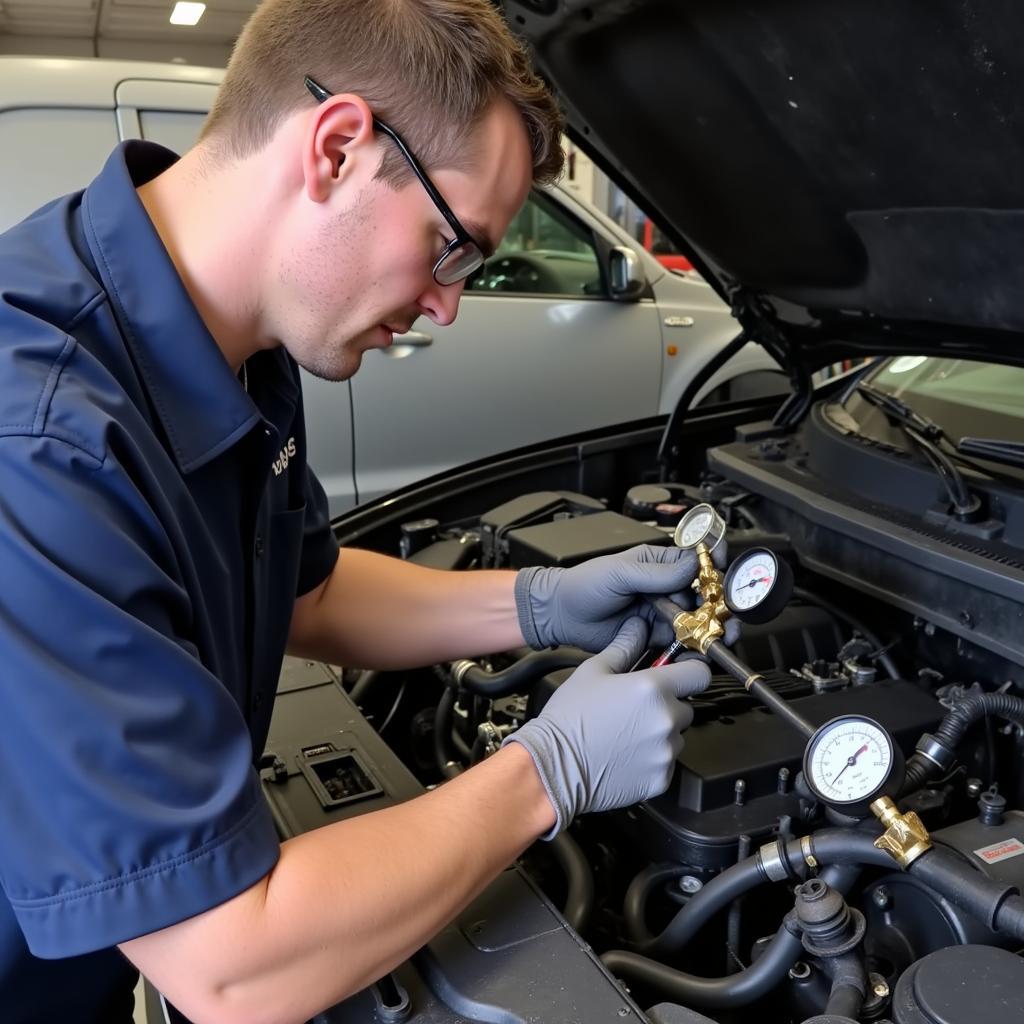Getting stuck with a broken car AC is a frustrating experience, especially on scorching summer days. If your car’s air conditioning isn’t blowing cold air, or worse, not blowing at all, it’s time to get it fixed. This comprehensive guide will walk you through everything you need to know about getting your car air conditioning fixed.
Understanding Your Car’s AC System
Before diving into the fixes, it’s helpful to understand the basic components of your car’s AC system. It consists of:
- Compressor: This is the heart of the system, pumping refrigerant throughout.
- Condenser: Located at the front of your car, the condenser cools the refrigerant, changing it from a gas to a liquid.
- Evaporator: Positioned inside the dashboard, the evaporator absorbs heat from the cabin air, cooling it down.
- Receiver/Dryer: This component stores refrigerant and removes moisture from the system.
- Expansion Valve/Orifice Tube: This regulates the flow of refrigerant into the evaporator.
- Hoses and Lines: These connect the various components and carry the refrigerant.
Common Causes of Car AC Problems
A malfunctioning AC system can stem from various issues. Here are some of the most common culprits:
- Refrigerant Leak: This is one of the most prevalent reasons for poor AC performance. Leaks can occur in hoses, connections, or components.
- Electrical Problems: Faulty wiring, a blown fuse, or a malfunctioning blower motor can all hinder AC operation.
- Compressor Failure: A worn-out compressor clutch or internal issues can prevent the compressor from functioning correctly.
- Condenser Issues: A dirty or damaged condenser can restrict airflow, reducing cooling efficiency.
- Evaporator Problems: A clogged or leaking evaporator can lead to poor airflow and cooling.
 Mechanic Checking Refrigerant Levels
Mechanic Checking Refrigerant Levels
Diagnosing the Problem
While some AC issues are straightforward, others require professional expertise to diagnose. If you’re comfortable with car maintenance, here are some initial checks you can perform:
- Check the Air Filter: A clogged cabin air filter can restrict airflow and impact cooling.
- Inspect the Fuses: Locate your car’s fuse box and check the fuses related to the AC system.
- Visually Examine the AC Components: Look for any visible damage, leaks, or loose connections.
When to Seek Professional Help
If your initial checks don’t reveal the problem or if you suspect a more complex issue, it’s crucial to seek professional help. Here are signs you should take your car to a mechanic:
- Warm Air Blowing: If the air coming from the vents isn’t cold even after running the AC for a while, it’s time for a professional inspection.
- Unusual Noises: Grinding, hissing, or clicking sounds coming from the AC system could indicate a significant problem.
- Foul Odors: Musty or unpleasant smells emanating from the vents might suggest mold or mildew growth in the evaporator.
[places to get car air conditioning fixed buffalo]
Getting Your Car AC Fixed
When it comes to fixing your car’s AC, you have several options:
- Dealerships: Dealerships have specialized technicians and access to original equipment manufacturer (OEM) parts, but their services often come at a higher price.
- Independent Mechanics: Independent mechanics can provide quality service at competitive rates.
- Specialized AC Repair Shops: These shops focus solely on AC systems, offering expert knowledge and specialized equipment.
Tips for Choosing a Repair Shop
- Read Reviews: Check online reviews and ratings to gauge the reputation of different repair shops.
- Ask for Recommendations: Reach out to friends, family, or online communities for recommendations.
- Get Multiple Quotes: Obtain quotes from several shops to compare prices and services offered.
- Inquire About Warranties: Choose a shop that offers warranties on their work and parts.
Cost of Car AC Repair
The cost of car AC repair can vary widely depending on the severity of the issue, the make and model of your car, and the chosen repair shop. Here’s a general estimate:
- Refrigerant Recharge: $50 – $150
- Condenser Replacement: $200 – $800
- Compressor Replacement: $400 – $1,500 or more
- Evaporator Replacement: $500 – $2,000 or more
[Get Air Conditioning Fixed Car baton rouge]
Preventing Future AC Problems
Regular maintenance can prevent many AC issues. Here are some preventative measures:
- Schedule Annual AC Inspections: Have your car’s AC system inspected by a professional technician annually, ideally before the start of summer.
- Regularly Replace the Cabin Air Filter: Change the cabin air filter every 12,000 miles or as recommended in your car’s owner’s manual.
- Run the AC System Periodically: Even during colder months, run the AC system for a few minutes every couple of weeks to keep the refrigerant circulating and lubricate the seals.
Conclusion
A properly functioning car AC is essential for a comfortable driving experience, especially during hot weather. By understanding the common causes of AC problems, performing basic checks, and knowing when to seek professional help, you can keep your car cool and enjoyable to drive all year round. If you’re experiencing any issues with your car’s air conditioning system, don’t hesitate to contact the experts at Autotippro for assistance.
Need Help with Your Car AC?
Contact AutoTipPro today at +1 (641) 206-8880 or visit our office at 500 N St Mary’s St, San Antonio, TX 78205, United States. Our team of experienced technicians is here to diagnose and repair your car AC problems efficiently and affordably.
[where to get car air conditioning fixed]
FAQs About Car AC Repair
Q: How often should I recharge my car’s AC?
A: Ideally, you shouldn’t need to recharge your AC system frequently. A well-maintained system should hold refrigerant for several years. If you find yourself recharging often, it indicates a leak that needs professional attention.
Q: Can I add refrigerant to my car’s AC myself?
A: While DIY refrigerant recharge kits are available, it’s generally not recommended unless you have experience working with AC systems. Improper handling of refrigerant can be dangerous and environmentally harmful.
Q: How can I tell if my car’s AC compressor is bad?
A: Some signs of a failing compressor include loud noises when the AC is on, warm air blowing from the vents, and the AC clutch not engaging.
[fix ac leaks in a car]
Q: How long does it take to replace a car AC compressor?
A: Compressor replacement is a labor-intensive job and can take anywhere from a few hours to a full day depending on the car model.
[where to fix my ac in my car]
Q: How can I prevent my car’s AC from smelling musty?
A: Regularly replacing the cabin air filter and running the AC system for a few minutes every couple of weeks can help prevent mold and mildew growth, which can cause musty odors.






Leave a Reply